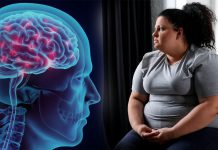According to new research, it has been examined that oxytocin hormone treatment goes well with solving the problem of obesity by making a person control his eating behavior. People often call oxytocin as the love hormone due to its efficiency in improving sexual reproduction, mother-infant bonding, social interaction, anxiety, trust and childbirth. How this hormone helps in childbirth? Actually, it increases the contraction of the uterus during labor and stimulates milk production.
Apart from its role during childbirth, it also affects our relationship with food. Let’s discuss, how?
Oxytocin lowers the effect of the brain’s reward signals called ventral tegmental area (VTA) for food and it affects our intake pattern and metabolism.
A team of researchers presented a report on how people taking oxytocin affected with obesity process images of food with high-calorie.
How obesity rates continue to rise:
Since 1975, the occurrence of obesity problem has risen 3 times worldwide, according to the World Health Organization. Around 2 billion adults were overweight in 2016 and over 650 million were obese.
An individual is called overweight if his BMI is 25 or more and a person’s obesity is associated with BMI 30 or more.
Obesity may lead to a variety of health conditions, such as type 2 diabetes, heart disease, stroke, and certain types of cancer.
Here is how oxytocin affects reward areas:
Oxytocin may be used to treat obesity in the near future. As per the past study, oxytocin nasal spray interacts with brain circuits to control eating behavior; however, it is not an approved treatment in the U.S.
The study’s lead investigator, Dr. Liya Kerem, a pediatric endocrinologist at MassGeneral Hospital for children and a researcher at Massachusetts General Hospital states, “Knowing how the drug exerts its effects is a critical step toward establishing oxytocin as a drug treatment for overeating and obesity.”
Their finding shows that oxytocin reduces the activation of part of the brain’s reward system and how that affects the connectivity between the VTA and the rest of the part of the brain.
The Boston Nutrition Obesity Research Center, the Nutrition Obesity Research Center at Harvard, and the National Institutes of Health supported the new research.
The investigators recruited 10 young men who were healthy but overweight or obese. The participants received a single dose of either oxytocin nasal spray or a placebo in two visits to the research lab.
After 1 hour, the participants looked at low-calorie foods, high-calorie foods, and nonfood objects images while they undertook functional magnetic resonance imaging (fMRI) to measure the changes in blood flow in the brain.
Compared with the placebo, oxytocin was responsible to weaken the functional connectivity between the ventral tegmental area and brain areas when the participants saw the images of high-calorie foods. Side effects of this treatment were not reported.
“This study is exciting because it shows that oxytocin modulates the pathways in the brain specifically during their responses to highly palatable, rewarding foods,” says Dr. Liya Kerem. Lead researcher Dr. Kerem explained that obese people have “abnormally hyperactivated brain reward areas” when they look at pictures of high-calorie foods, in spite of not being hungry. Therefore, there is a need for such medications like oxytocin to treat obesity.























